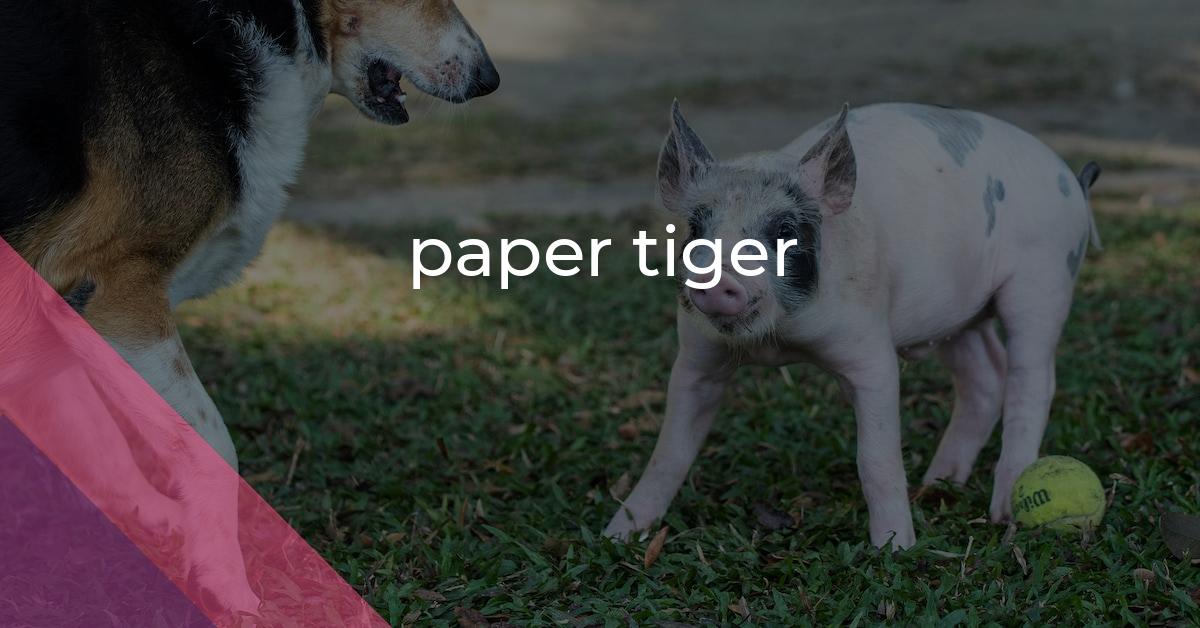paper tiger: Idiom Meaning and Origin
What does ‘paper tiger’ mean?
The idiom "paper tiger" refers to something or someone that appears to be powerful or threatening, but is actually weak or ineffectual.

Idiom Explorer
The idiom "wolf in sheep's clothing" refers to someone who appears to be harmless or gentle, but is actually dangerous or malicious.
The idiom "sabre-rattling" refers to aggressive and threatening behavior or actions used to intimidate or provoke others, often through military displays or aggressive rhetoric.
An idiom often used to describe a person who is disliked or considered bad, with negative qualities or behavior.
The idiom "ring hollow" means that something sounds insincere or not genuine, lacking in substance or meaning.
The idiom "ring false" means that something seems insincere or not genuine. It refers to a feeling that a statement or situation is untrue or artificial.
An idiom used to describe someone or something that is highly unusual or unique; as rare as a rare animal.
The idiom "queen of beasts" refers to the lion, being the most powerful and dominant creature in its habitat. Similarly, it can signify a person who is in a position of authority and possesses great strength and influence.
The idiom "powers that be" refers to the influential individuals or groups who hold authority or control over a particular situation or organization.
The idiom "power-hungry" refers to a person who is excessively eager or desperate to gain or maintain power. They are driven by a strong desire for control or authority and may use unethical or manipulative means to achieve their goals.
The idiom "power behind the throne" refers to a person who holds significant influence and control over a situation or an organization without having an official title or position of authority. This individual often pulls the strings and makes key decisions behind the scenes, while someone else holds the visible position of power.
Unmasking Illusion
The idiom "paper tiger" has its origins in ancient Chinese culture. The term itself derives from the Chinese phrase "zhǐ lǎohǔ," which translates to "paper tiger" in English. In Chinese culture, the tiger is a symbol of strength and power, often used to represent militancy. However, "paper tiger" carries a negative connotation, implying something that appears threatening but is actually weak or ineffectual.
The idiom became more widely known in the English language during the mid-20th century. It gained popularity after Mao Zedong, the leader of the People's Republic of China, used it in his speeches and writings. Mao used the term to criticize political opponents and to reinforce the idea that they were essentially powerless and could be easily defeated.
Over time, the idiom "paper tiger" has expanded beyond its original political context and entered common usage in various fields, including politics, business, and sports. It is often used to describe individuals, organizations, or ideas that may seem formidable or threatening but lack substance or real power. The idiom suggests that appearances can be deceiving and encourages people to look beyond surface-level intimidation.
In the business world, the term "paper tiger" is frequently used to describe a company that appears strong and successful but has underlying weaknesses. It may refer to a firm with impressive financials but lacking in innovation or a competitive advantage. Similarly, in politics, the idiom is employed to criticize leaders or nations that project strength but have limited capabilities or influence.
The idiom "paper tiger" can also be applied to individuals who present themselves as potent but fail to live up to their perceived reputation. This can be seen in various contexts, such as sports, where a fierce competitor may turn out to be less formidable than initially expected. The idiom serves as a reminder that true strength and power reside in substance rather than mere appearances.
In addition to the idiom "paper tiger," there are several related idioms that convey similar meanings and concepts. One such idiom is "have a tiger by the tail." This expression is used to describe being in a situation where one has taken on a challenge or responsibility that is difficult to manage or control. It implies that the individual is dealing with a powerful force that they may struggle to handle. The idiom highlights the potential dangers and risks involved in undertaking such a task.
Another related idiom is "have the tiger by the tail." This phrase is similar to "have a tiger by the tail" but carries a slightly different meaning. It suggests that the individual has successfully taken control of a challenging situation or responsibility and is capable of managing it effectively. The idiom conveys a sense of confidence and competence in handling difficult circumstances.
The idiom "wolf in sheep's clothing" is also relevant to the concept of a "paper tiger." This expression is used to describe someone who presents themselves as harmless or friendly but is actually deceitful or dangerous. It implies that appearances can be deceiving and serves as a cautionary warning to be wary of trusting others based solely on their external demeanor.
Similarly, the idiom "paper bag" shares similarities with the concept of a "paper tiger." It is used to describe something that is weak, flimsy, or insubstantial. Just as a paper bag lacks durability and strength, a "paper tiger" lacks real power or influence. Both idioms emphasize the idea that appearances can be deceiving and that true strength lies in substance rather than superficial characteristics.
Finally, the idiom "one's bark is worse than one's bite" is another idiomatic expression that relates to the concept of a "paper tiger." It is used to describe someone who threatens or appears aggressive but is ultimately harmless or ineffective. The idiom suggests that although a person may talk or act tough, they lack the ability or willingness to follow through on their threats. It highlights the contrast between initial appearances and actual capabilities.
While the idiom "paper tiger" is widely understood and used, its meaning and implications continue to evolve. In today's interconnected world, where information and opinions are easily shared, it is essential to remain critical and discerning. The idiom reminds us to question authority, challenge assumptions, and determine the underlying realities behind external appearances.
Example usage
Examples of how the idiom "paper tiger" can be used in a sentence are:
- She may act tough, but she is just a paper tiger.
- The country's military might appeared formidable, but it was revealed to be a paper tiger during the conflict.
- Many politicians use empty threats and promises, making them nothing more than paper tigers.
More "Metaphorical" idioms



